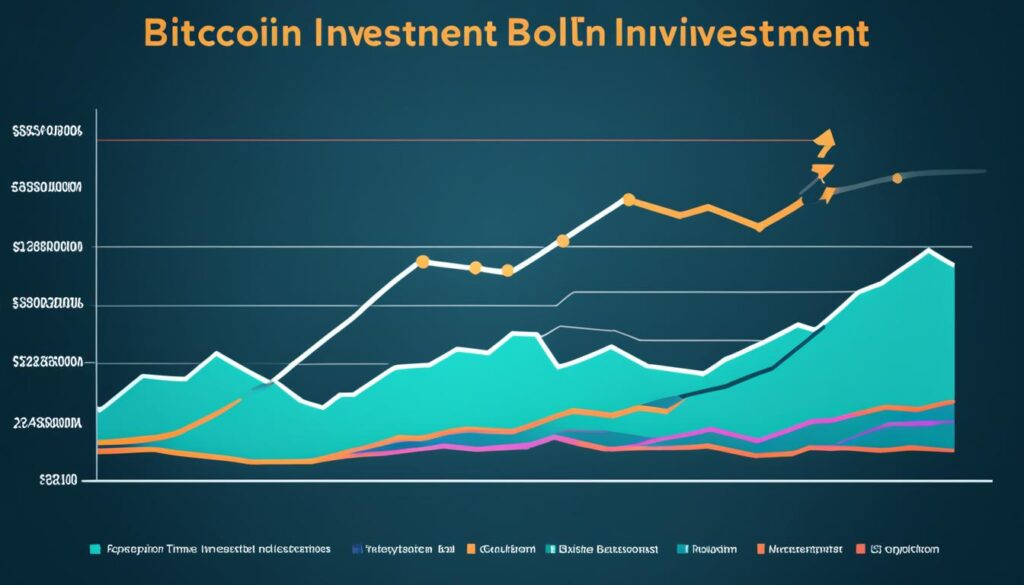
Are Institutions Buying Bitcoin? Insight Guide
Are Institutions : Welcome to our insight guide on the topic of institutional investment in Bitcoin. In recent years, the cryptocurrency market has witnessed a surge of interest and involvement from major institutions. This has brought about significant changes and opportunities for both institutional investors and the overall crypto market.
In this guide, we will explore the reasons behind the increasing institutional adoption of Bitcoin, analyze key drivers influencing their decisions, and examine the impact of regulatory changes on institutional involvement. We will also provide a comprehensive understanding of institutions and their pivotal role in shaping the cryptocurrency market.
As the interest and participation of institutions in the crypto market continue to grow, it becomes crucial to delve into their perspectives, investment patterns, and the factors driving institutional money flow into Bitcoin. By gaining a deep understanding of these dynamics, investors and enthusiasts can make more informed decisions and anticipate future trends.
Throughout this insightful guide, we will analyze case studies of major institutions that have invested in Bitcoin, showcasing their strategies, investment patterns, and the overall market impact. By examining the historical trends and accumulation phases, we can gain insights into the broader implications of institutional involvement in the crypto space.
Stay tuned for the subsequent sections where we will provide a comprehensive overview of institutional investment in Bitcoin, covering its significance, the role of institutions in the cryptocurrency market, and the future prospects of this growing trend. Let’s explore the fascinating world of institutions buying Bitcoin together!
Exploring the Surge of Institutional Investment in Bitcoin
As Bitcoin continues to gain widespread recognition and acceptance, there has been a notable surge of institutional investment in the cryptocurrency. Institutions, including financial giants, hedge funds, and pension funds, are increasingly recognizing the potential of Bitcoin as a valuable investment asset.
Understanding the Institutional Perspective on Bitcoin
Institutions are taking an active interest in Bitcoin due to several key factors. One of the primary motivations is the potential for substantial returns. Bitcoin’s volatile nature offers the opportunity for significant price appreciation, attracting institutions seeking to maximize their investment gains.
Moreover, institutional investors view Bitcoin as a means of portfolio diversification. By incorporating cryptocurrency into their investment strategies, institutions can reduce their reliance on traditional assets and mitigate risk in a rapidly changing financial landscape.
Key Drivers for Institutional Money Flowing into Crypto
Several drivers have played a crucial role in the significant influx of institutional money into the crypto market. One of these key drivers is the growing acceptance and recognition of Bitcoin as a legitimate and mainstream asset. As Bitcoin gains traction in the financial industry, institutions are becoming more comfortable with the idea of investing in cryptocurrencies.
Additionally, the advancements in Bitcoin custodial services and infrastructure have facilitated the entry of institutional investors into the market. These services provide secure storage solutions and compliant trading platforms, addressing the concerns regarding asset security and regulatory compliance.
How Regulatory Changes are Influencing Institutional Decisions
The impact of regulatory changes cannot be understated in the context of institutional investment in Bitcoin. As governments and regulatory bodies establish clearer guidelines and regulations for cryptocurrencies, institutions feel more confident in navigating the legal landscape.
Regulatory clarity not only offers a sense of security but also paves the way for increased institutional participation. Institutions are more likely to allocate funds to Bitcoin when they can operate within a regulated framework, ensuring compliance and protecting their investments.
Overall, the surge of institutional investment in Bitcoin signifies a fundamental shift in the perception of cryptocurrencies from fringe assets to mainstream investment opportunities. Understanding the institutional perspective, key drivers, and the influence of regulatory changes allows us to gain insights into this emerging trend.
What is an Institution and Their Role in the Cryptocurrency Market
In the context of the cryptocurrency market, institutions play a crucial role in shaping market dynamics and influencing trends. But what exactly do we mean when we refer to institutions and what role do they play in the cryptocurrency market? Let’s take a closer look.
An institution, in this context, refers to entities such as financial institutions, hedge funds, and pension funds that have the resources and expertise to invest in various assets, including cryptocurrencies like Bitcoin. These institutions bring substantial capital, market knowledge, and professional expertise to the table, making them key players in the crypto space.
One of the main reasons why institutions are important in the cryptocurrency market is their ability to drive widespread adoption. When reputable institutions invest in Bitcoin, it not only validates its potential as an asset but also attracts the attention of other investors, both retail and institutional. This increased demand can lead to price appreciation and market growth.
“Institutions bring substantial capital, market knowledge, and professional expertise to the table, making them key players in the crypto space.”
Additionally, institutions often have a diversified investment portfolio, which includes various asset classes. Including cryptocurrencies like Bitcoin in their portfolios allows them to diversify risk and potentially enhance their returns. This diversification strategy is based on the idea that different asset classes perform differently under different market conditions, reducing the overall risk exposure.
Furthermore, institutional involvement brings a level of stability and trust to the cryptocurrency market. These entities are subject to regulatory oversight and adhere to strict compliance measures. This regulatory scrutiny can help protect investors against fraudulent schemes and market manipulation, fostering confidence in the crypto ecosystem.
Overall, institutions have a significant impact on the cryptocurrency market. Their investments, market influence, and regulatory compliance can shape the direction and growth of Bitcoin and other cryptocurrencies. As the market continues to evolve, monitoring institutional involvement becomes crucial in understanding the trends and potential future developments in the cryptocurrency space.

Are Institutions Buying Bitcoin, Trend in Institutional Adoption, Case Studies, Investment Patterns
As the popularity of Bitcoin continues to grow, institutions are increasingly joining the cryptocurrency market. This section takes a closer look at the trends in institutional adoption of Bitcoin, showcasing the changing landscape and highlighting the factors driving this surge in interest.
Trends in Institutional Adoption of Bitcoin
Over the years, there has been a noticeable increase in institutional adoption of Bitcoin. Institutional investors, including financial institutions, hedge funds, and pension funds, are recognizing the potential of Bitcoin as a store of value and a hedge against inflation. This growing adoption indicates a shift in the perception of Bitcoin from a speculative asset to a legitimate investment option.
Several key factors contribute to the institutional adoption trends. First, the increasing institutional interest can be attributed to the growing acceptance and regulation of cryptocurrencies. Clearer guidelines and a more stable regulatory environment have boosted institutional confidence in entering the market.
Furthermore, institutions are recognizing the potential for higher returns by investing in Bitcoin. The cryptocurrency’s limited supply and scarcity make it an attractive asset for long-term investment and portfolio diversification. In an era of low-interest rates and economic uncertainty, institutions are turning to Bitcoin as a strategic investment to protect and grow their capital.
Additionally, the institutional adoption of Bitcoin is driven by the increasing demand from clients and customers. With more individuals expressing interest in cryptocurrencies, institutions are responding by offering investment opportunities in Bitcoin. This customer-driven approach is further fueling the institutional investment in the cryptocurrency market.
Case Studies: Major Institutions That Have Invested in Bitcoin
Several major institutions have made notable investments in Bitcoin, further solidifying its position in the mainstream financial landscape.
JPMorgan Chase, one of the largest financial institutions in the world, has embraced Bitcoin and blockchain technology. The company has invested in blockchain startups and recently launched its own digital currency, JPM Coin, for faster and more secure cross-border transactions.
MicroStrategy, a prominent business intelligence company, made headlines when it announced its Bitcoin investment strategy. The company significantly increased its Bitcoin holdings and continues to view it as a long-term store of value.
Institutional asset manager Grayscale Investments has also played a significant role in institutional adoption of Bitcoin. Its Grayscale Bitcoin Trust allows institutions to gain exposure to Bitcoin without directly owning the cryptocurrency.
Analysis of Institutional Investment Patterns Over Time
Studying institutional investment patterns in Bitcoin provides valuable insights into the market dynamics and potential future trends.
One notable pattern is the accumulation phase, where institutions gradually increase their Bitcoin holdings. This strategy allows them to build significant positions while minimizing price impact and maximizing potential returns. Accumulation phases often precede periods of increased market activity and price appreciation.
Additionally, institutions have adopted profit-taking strategies to capitalize on Bitcoin’s price volatility. By strategically selling portions of their holdings during price rallies, institutions lock in profits and manage risk. This pattern demonstrates a sophisticated approach to investment and showcases the growing maturity of the institutional market.
Overall, the trends in institutional adoption, case studies of major institutions, and investment patterns all contribute to the evolving narrative of Bitcoin as a mainstream asset class. Institutions are increasingly recognizing the value and potential of Bitcoin, shaping the future of the cryptocurrency market.

Conclusion
Throughout this guide, we have explored the growing trend of institutional investment in Bitcoin and its impact on the cryptocurrency market. The increasing interest and involvement of major institutions in Bitcoin signify a significant shift in the perception and adoption of digital assets.
From our analysis, it is evident that institutions are attracted to Bitcoin for various reasons. They view it as a potential store of value, a hedge against traditional asset classes, and a gateway to future financial innovations. However, regulatory changes also play a crucial role in shaping institutional decisions, as the evolving legal framework provides more clarity and legitimacy to the crypto market.
The rise of institutional investment in Bitcoin has brought about positive market trends, such as increased liquidity, heightened price stability, and enhanced market efficiency. Case studies of major institutions that have invested in Bitcoin demonstrate the potential for substantial returns and long-term value creation.
Looking ahead, the future prospects of institutional involvement in Bitcoin remain promising. As more institutions recognize the benefits and potential of cryptocurrencies, we can expect to see continued growth in institutional adoption. This trend has the potential to further legitimize Bitcoin and other digital assets, leading to broader mainstream acceptance and integration.














